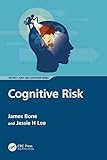Cognitive risk James Bone and Jessie Lee
Material type: TextSeries: Security, Audit and Leadership SeriesPublisher: Boca Raton, FL : CRC Press, 2023Description: xv, 231 pagesContent type:
TextSeries: Security, Audit and Leadership SeriesPublisher: Boca Raton, FL : CRC Press, 2023Description: xv, 231 pagesContent type: - text
- unmediated
- volume
- 9781032039114
- 658 23
- HD58.7 .B655 2023
| Item type | Current library | Call number | Status | Date due | Barcode | |
|---|---|---|---|---|---|---|
 Books
Books
|
Raman Research Institute Library | 681.32.091 BON (Browse shelf(Opens below)) | Available | 30020 |
Browsing Raman Research Institute Library shelves Close shelf browser (Hides shelf browser)

|

|

|

|

|
No cover image available | No cover image available | ||
| 681.32.091 BOD Artificial intelligence and natural man / | 681.32.091 BOL Turing's man : | 681.32.091 BON Cognitive hack : the new battleground in cybersecurity... the human mind / | 681.32.091 BON Cognitive risk | 681.32.091 BRA Computer game-playing : | 681.32.091 BRA Prolog programming for artificial intelligence | 681.32.091 BRA Computational models of discourse |
Includes bibliographical references and index.
"Cognitive Risk is a book about the least understood, but most pervasive risk to mankind - cognitive risks. Cognitive risks are subconscious and unconscious influence factors on human decision-making: heuristics and biases. To understand the scope of cognitive risk we look at case studies, corporate and organizational failure and the science that explains why we systemically make errors in judgment and repeat the same errors. Cognitive risk takes a multidisciplinary and pedestrian stroll through behavioral science with a light touch using stories to explain why we consistently make cognitive errors that not only increase risks, but also simultaneously fails to recognize these errors; in ourselves or our organization. This science has deep roots in organizational behavior, psychology, human factors, cognitive science, and behavioral science all influenced by the classic philosophers and enabled through advanced analytics and artificial intelligence. The point of the book is simple. Humans persist with bounded rationality, but as the speed of information, data, money, and life accelerates we will need the right tools to not only keep pace, but to survive. Finally, the book closes with a foundational solution. A cognitive risk framework for enterprise risk management and cyber security. There are five pillars in a cognitive risk framework with five levels of maturity, yet there is no prescribed maturity level. It is more a journey of different paths. Each organization will pursue its own path, but the goal is the same - minimize the errors that could have been avoided. We explain why conversations about risks are hard to discuss and why we systematically ignore the aggregation of these risks hidden in collective decision-making in an organization. The cognitive risk framework is a framework designed to explore the two most complex risks organizations face: Uncertainty and Decision-Making under uncertainty. The first pillar is Cognitive Governance. A structured approached for institutionalizing rational decision-making across the enterprise. Each pillar is complimentary in a succession of continuous learning. There is no endpoint because it evolves with technology. Enterprise risk is a team effort in intelligence grounded in good decision-making. We close with a call for designers of risk solutions enabled by the right technology and nurtured by collaboration. We hope you enjoy the book with this context"-- Provided by publisher.
There are no comments on this title.

